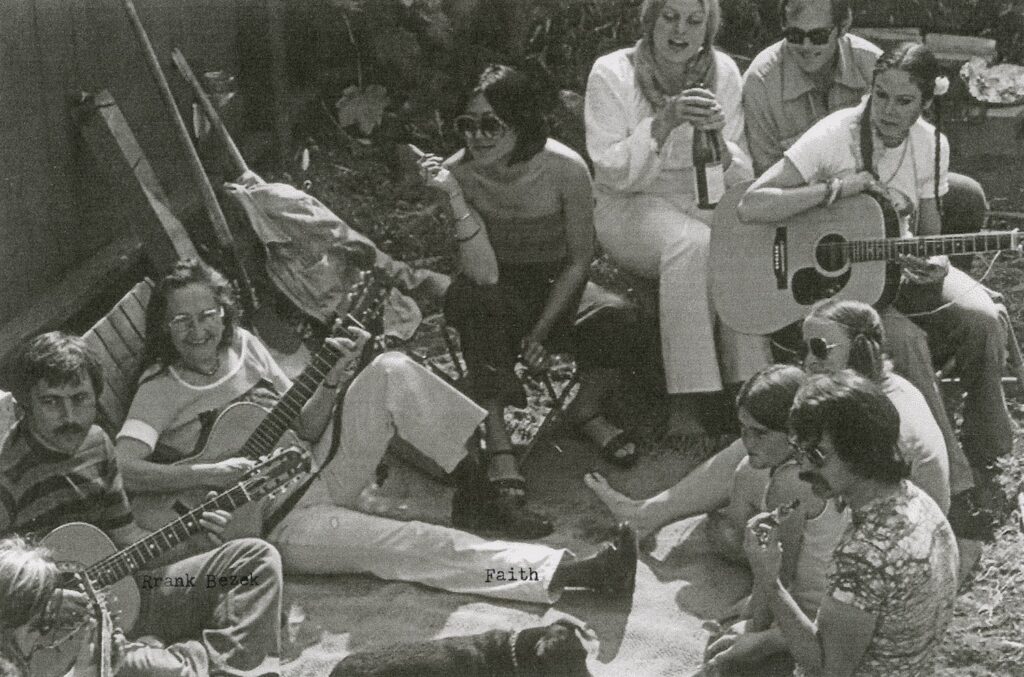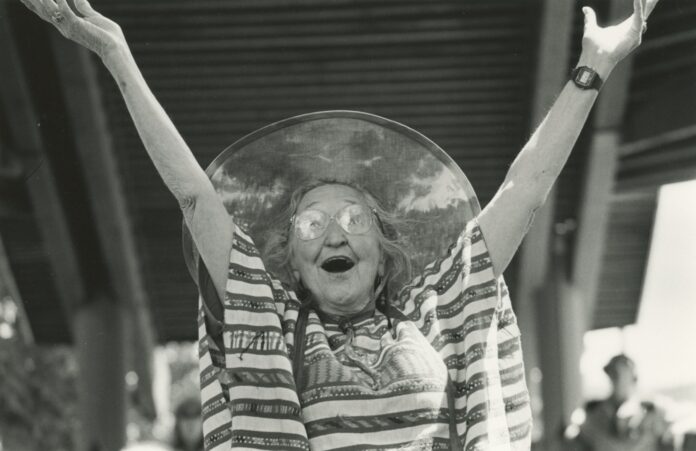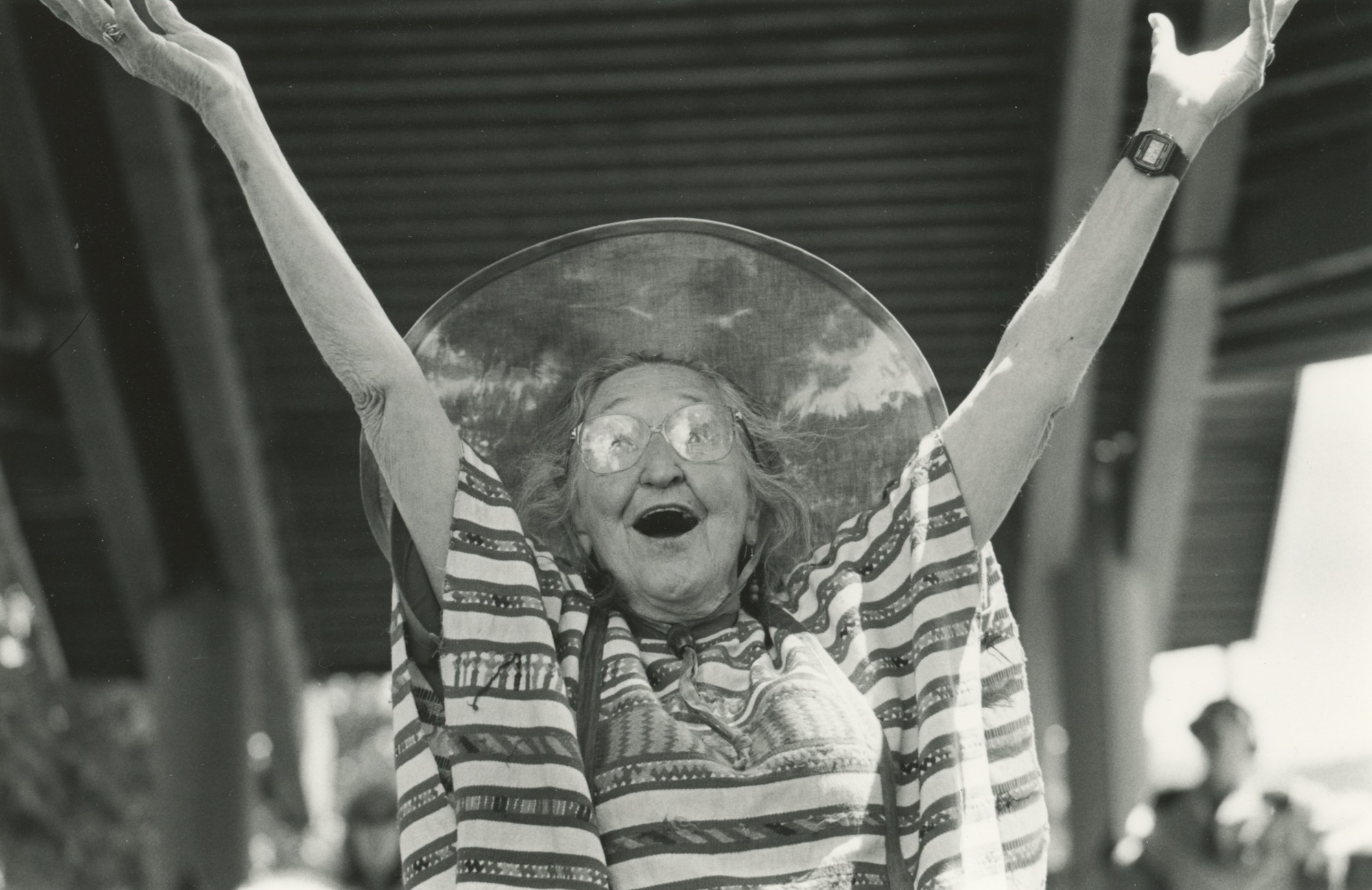There’s a photo of Faith Petric (1914-2013) from Estelle Freedman and Christie Herring’s new documentary Singing for Justice (Sat/22, 1pm, Roxie, SF; March 14, 8pm, KQED) that I can’t stop thinking about. Frank Bezek snapped the candid shot at a 1960s San Francisco folk music party, as a reclining Faith was singing and playing guitar among a crowd of hip admirers. That one photo brings to life the moment when activism, music, and off-the-charts, timeless cool—check out those looks!—converged, far more than two hours and 20 minutes of Timothée Chalamet as Bob Dylan in the recent Hollywood movie A Complete Unknown. Right now, I would like to live inside that picture.

Over the course of her 98 years—50 of them as head of the San Francisco Folk Music Club, during which she held bi-monthly musical jams at her Clayton Street home—Petric led one of those infuriatingly productive and inspirational lives that renews one’s faith in humanity, all while singing some of the most rousing, humorous, and catchy tunes ever written.
She marched for Civil Rights in Selma and Montgomery, was integral to the peace movement, defended gay couples, helped Spanish Civil War refugees as part of the anti-fascist movement, joined the Industrial Workers of the World, and was targeted during the McCarthy era. She was a ‘Rosie the Riveter.’ She was a social worker. She worked for FDR’s Farm Security Administration. After she retired, she dedicated herself to music (a “ramblin’ renegade grandma” she called herself in “Geritol Gypsy”), touring the world playing popular music halls and trenchant protest marches. No wonder she was known as ‘the Fort Knox of folk music”—her life was full of golden bars.
“Faith’s life is a vital reminder of the joy inherent in the work for social change,” says Herring. Freedman adds, “Film audiences spontaneously sing together during the screenings!” That’s the kind of renewable community energy we need right now, of course. I spoke with Stanford professor Freedman and Stanford MA film grad Herring about making the movie and tracing such an active, long life.
48 HILLS What sparked the idea to work together on this film, and how did you come to know about Faith?
ESTELLE FREEDMAN I knew Faith through the San Francisco Folk Music Club, where I began singing in the late 1980s, only gradually realizing the club was meeting at her SF home. She knew so many songs and so many musicians! Professionally I’m an historian of women, and in the 1990s I conducted an extensive oral history with Faith. That is how I learned about her rich history of political, as well as musical, activism—organizing for peace, for example, from the time she was in college during the 1930s up into her 90s. When she was around 95, Faith asked me if I knew of any filmmakers who might be interested in her collection of performance tapes. I began asking around and a colleague at Stanford recommended Christie Herring, who had earned her graduate film degree there. Thankfully, Christie found Faith and her story compelling, and she drew me into the work of filmmaking, not only as I expected as historical consultant. Making this film has been a labor of love for almost 15 years, made possible in large part by the folk music community Faith nurtured during her lifetime.
CHRISTIE HERRING When I met Estelle and then went on to meet Faith Petric (camera in hand), I was in the middle of making my film The Campaign—following the grassroots effort to defeat Proposition 8 and to protect queer marriage rights. After that heartbreaking defeat at the ballot box in 2008, I was gaining a growing appreciation for the long work of social justice activism and the importance of community to sustain the work. And then I met Faith Petric, someone who truly epitomized an ability to renew herself and nurture a resilience in others to KEEP IT GOING. For her that meant joy, it meant work, it meant connection to other people. An important way that she fostered important connections was through music. I grew up immersed in music, and in fact, my sister Caroline Herring is a talented singer songwriter. I was hooked.
48 HILLS Faith led such a long and active life—what were one or two surprising or favorite things about her that you discovered while telling her story?
CHRISTIE HERRING Because I met Faith through the making of the film, each turn of her life was a surprise —and there were many! I so appreciated the opportunity to hear from her own perspective (her interviews, her records, her photographs) what it was like to live out her political commitments on a granular level. To look back—with her—at nearly 100 years of her life was a great privilege. At each decisive activist turn, she seemed to feel “I just had to do that, I had no choice.” Put together, they provide a powerful legacy of action and also insight into the very human decisions that create a life of purpose.
ESTELLE FREEDMAN I had not known of her log cabin origins and the hard-scrabble rural life of her early years. Her memories of marching from Selma to Montgomery in 1965, of the music she heard, and her staying on to volunteer after the march epitomized her personal commitment.
48 HILLS What do you feel is the importance of telling Faith’s story now?
CHRISTIE HERRING Today we need reminders that the work can continue, with joy and with others, regardless of the challenge of the times. Faith Petric reminds us that we are not alone in our efforts and that each act, great and small, can contribute to a better world for us all. As her friend, the musician Bob Reid, says in the film, “It was important to Faith that we’re here to do this. This is our responsibility. If the world is going to become a better place, it’s because we do something about it, and not because it just happened.”
ESTELLE FREEDMAN Faith’s commitment to putting yourself on the line in the cause of social justice over the long haul—despite FBI surveillance and financial insecurity; her belief that our greatest triumph is that we keep the movements alive; and her ability to inspire both political action and musical communities. It all provides a legacy we sorely need today.
48 HILLS What’s your favorite Faith Petric song or rendition?
ESTELLE FREEDMAN Too many to list! In the film, her cover of Eliot Kenin’s “Ain’t Been Doin’ Nothing if You Ain’t Been Called a Red” encapsulates her own life story so well. I loved singing songs related to women’s history with her: Amelia Earhart’s Last Flight, Union Maid, and many more.
CHRISTIE HERRING I agree with Estelle, too many to list! One, though, is Eliot Kenin’s “Ain’t Been Doin’ Nothin…” with it’s “who me?” sense of humor in concert with quite direct activism. When Faith sings it (and she LOVED his song!), you can hear her life experience in the way she delivers words. Another song that has stuck with me through the years of editing is “Grandma’s Battlecry” by Irene Paul and Barbara Tilson. I’m older than I was when we began this film! The refrain: “I marched and marched and marched, oh lord, I’m sure I’ve done my due. I’ve marched since I was barely ten, and now I’m seventy two.” These words have rung in my ears quite often, as I am inspired to think about what motivated Faith Petric to keep going despite personal challenges.
SINGING FOR JUSTICE Sat/22, 1pm, Roxie, SF, more info here and March 14, 8pm, KQED/PBS





